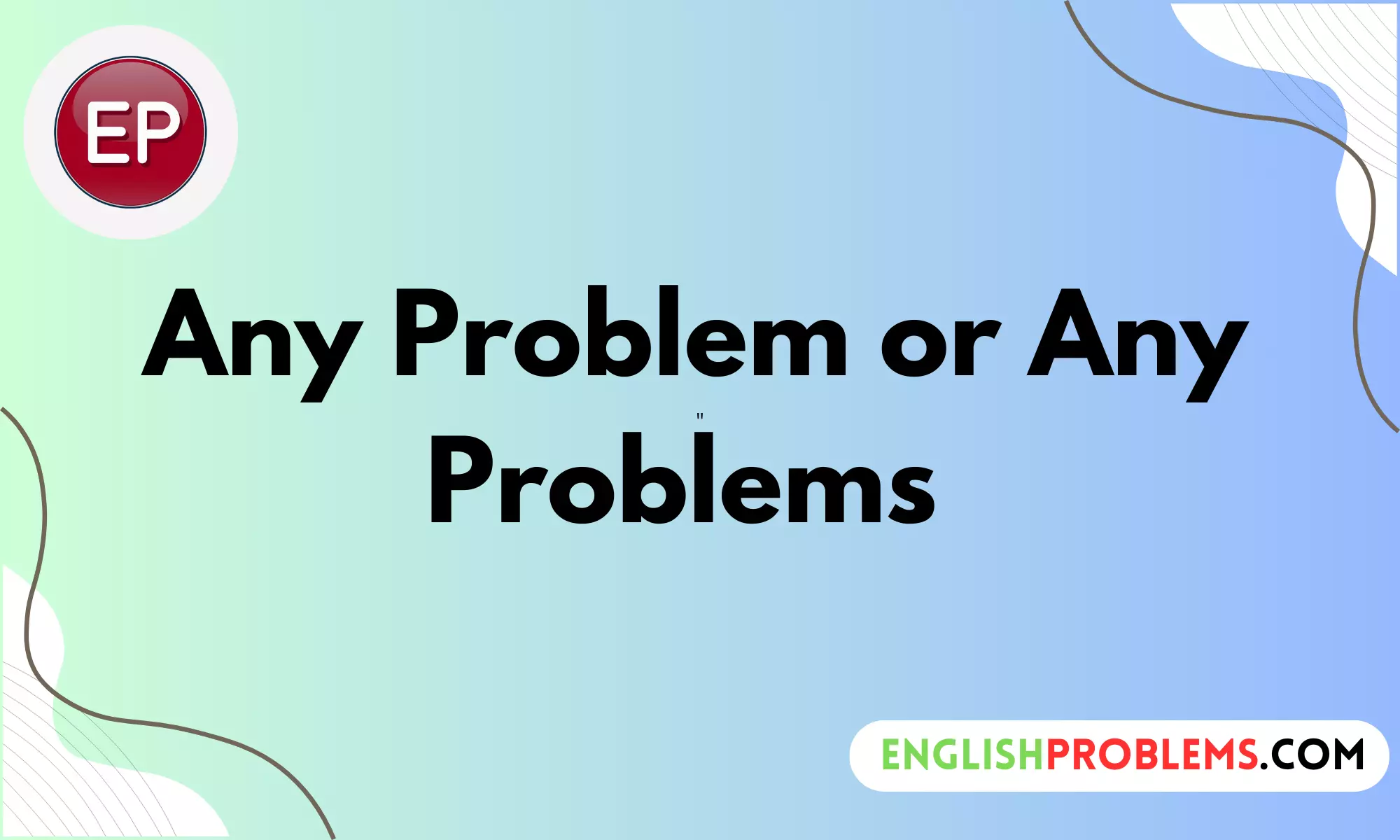Understanding the nuances of English grammar can be challenging, especially when it comes to seemingly simple phrases. One common area of confusion involves the use of “any problem” versus “any problems.” Although both expressions might seem similar, their usage depends on specific grammatical contexts.
In this blog post, we will explore the correct usage of these phrases, delve into the rules of singular and plural nouns, and provide practical examples to help you master this aspect of English grammar.
Understanding Singular and Plural Nouns
Nouns are essential components of sentences, naming people, places, things, or ideas. They can be classified into two main types: singular and plural.
Singular vs. Plural Nouns
- Singular Nouns refer to one person, place, thing, or idea. For example, “cat,” “book,” and “idea” are singular nouns.
- Plural Nouns denote more than one person, place, thing, or idea. For instance, “cats,” “books,” and “ideas” are plural nouns.
The distinction between singular and plural nouns affects verb agreement and the choice of determiners. Here’s a quick table summarizing the changes:
Singular NounPlural Nouncatcatsbookbooksideaideas
Countable vs. Uncountable Nouns
Countable nouns are those you can count individually, such as “apple” or “chair.” They can be used in both singular and plural forms. Uncountable nouns, like “water” or “furniture,” represent things that cannot be counted individually and are typically used in the singular form.
Examples of Countable Nouns:
- One apple, two apples
- One chair, three chairs
Examples of Uncountable Nouns:
- Water (not “waters”)
- Furniture (not “furnitures”)
Understanding these categories helps in determining the correct usage of phrases like “any problem” or “any problems.”
Usage of “Any” in English Grammar
The word “any” is a versatile determiner used to express quantity, often in questions, negative statements, or conditional clauses. It can be used with both singular and plural nouns, depending on the context.
Role of “Any”
- Questions: Used to inquire about the existence or amount of something.
- Example: “Do you have any problem with this plan?”
- Negative Statements: Indicates the absence of something.
- Example: “I don’t have any problems with the new policy.”
- Conditional Clauses: Used to express hypothetical situations.
- Example: “If you have any problem, please contact me.”
Examples
- Singular Context: “Do you have any problem with the schedule?”
- Plural Context: “Are there any problems with the new software?”
Using “any” correctly involves understanding whether the context requires a singular or plural noun.
When to Use “Any Problem”
Specific Situations for “Any Problem”
- Singular Focus: When referring to one specific issue or concern.
- Example: “If there is any problem with the document, please let me know.”
- Formal Contexts: Often used in formal writing or communication where precision is crucial.
- Example: “Should any problem arise, we will address it promptly.”
Why Use “Any Problem”:
- It is precise and direct, suitable for contexts where only a single issue is being addressed.
- It fits well in formal communication where clarity is important.
When to Use “Any Problems”
General Situations for “Any Problems”
- Multiple Issues: When addressing or inquiring about more than one potential issue.
- Example: “Are there any problems with the current system?”
- Casual and Everyday Contexts: Commonly used in informal speech and writing.
- Example: “Let me know if you have any problems with the setup.”
Why Use “Any Problems”:
- It implies a broader scope, covering the possibility of multiple issues.
- It is more natural in everyday conversations and less formal writing.
Common Mistakes and How to Avoid Them
Common Errors
- Using Singular When Plural Is Needed: Saying “Is there any problems?” instead of “Are there any problems?”
- Mixing Contexts: Using “any problem” in contexts where multiple issues are implied.
Tips for Correct Usage
- Match the Noun Form: Ensure that the noun matches the form of “any” used. Use “any problem” for singular and “any problems” for plural.
- Consider Context: Reflect on whether you’re referring to a single issue or multiple issues.
- Grammar Check Tools: Utilize online grammar checkers to identify and correct mistakes. Tools like Grammarly or Hemingway can help catch errors.
Example Correction:
- Incorrect: “Do you have any problems with this issue?” (if referring to a single issue)
- Correct: “Do you have any problem with this issue?”
Contextual Considerations
Cultural Variations
Different English-speaking regions might have slight variations in usage, but the basic rules for “any problem” and “any problems” are consistent. However, informal speech in various regions might prefer one form over the other.
Formal vs. Informal Contexts
- Formal Writing: Use “any problem” for precision.
- Informal Speech: “Any problems” is more natural and commonly used.
Practice Exercises
Fill-in-the-Blank Sentences
- “If you encounter __________ with the software, please report it immediately.” (any problems/any problem)
- “Are there __________ with the new guidelines?” (any problems/any problem)
Multiple Choice Questions
- “Do you have __________ with the new policy?”
- a) any problems
- b) any problem
- “If there is __________ with the report, let me know.”
- a) any problems
- b) any problem
Answers:
- a) any problems
- b) any problem
Conclusion
In summary, understanding when to use “any problem” versus “any problems” hinges on whether you are referring to a single issue or multiple issues. By focusing on context and noun form, you can make accurate and clear statements. Whether in formal writing or casual conversation, using these phrases correctly ensures effective communication.

Freya Hughes is a dedicated language enthusiast who turns grammar lessons into enjoyable learning experiences. Her approachable and friendly manner ensures that even the most daunting grammar rules become accessible to all.










